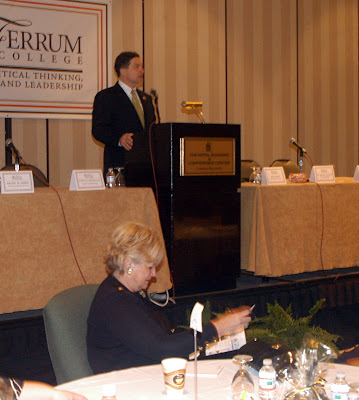Thursday, April 7, 2011
Regulatory Innovation Needed, Says Federal Reserve Bank Hed
“In my view, the question is not whether financial innovation is inherently good or bad. Instead, we should think about whether particular financial innovations are improving people’s well-being. And that, I think, is largely dependent upon the structure of the regulations and policies under which financial firms operate.”
That was the message this morning from Richmond Federal Reserve Bank President Jeffrey Lacke. He emphasized innovation in the new financial regulatory environment at the Ferrum College Forum on Critical Thought, Innovation and Leadership at Hotel Roanoke & Conference Center.
Lacker acknowledged that there have been some innovative mortgage products that were popular and later became problematic. But he pointed out that there have been some changes in the regulations requiring banks to hold more capital in lending. “We’ve strengthened consumer protections that require the lenders to have a better idea as to whether the borrower can repay.”
Why did Fannie Mae and Freddie Mac guarantee so many loans that became troubled, ultimately resulting in those agencies being put into conservator-ship? “I have alluded to one very important reason: Those institutions were widely perceived correctly as it turned out, as being inside the safety net,” says Lacker. “As a result, they had much less incentive to provide sufficient scrutiny when evaluating many of the loans they guaranteed or securities they purchased.
Lacker says a consensus has emerged that Fannie and Freddie need to be wound down and that one way to do this would be to shut them down immediately. “While closing them down has some appeal, I don’t think it is politically feasible, or economically desirable," he says. "Such an approach would require overly rapid adjustments in housing finance arrangements, as the housing market is still coping with the aftermath of the bust.
In February, the Department of Treasury and the Department of Housing and Urban Development issued a report to Congress outlining some ways to “wind down both institutions, creating the conditions for private capital to play the predominant role in housing finance.”
Among their proposals are: increase guarantee fees to bring in more private capital; increase private capital ahead of Fannie Mae and Freddie Mac guarantees; reduce conforming loan limits; and wind down Fannie Mae and Freddie Mac’s investment portfolio.
“As the agencies’ report states,” he says, Fannie and Freddie “were allowed to behave like government-backed hedge funds, managing large investment portfolios for the profit of their shareholders with the risk ultimately falling largely on taxpayers.” Lacker says he agrees with that assessment, and he believes it was a mistake that must not be repeated.
How would a government shutdown affect availability of money, especially for small businesses? “I don’t think it would have a major affect. Small Business Administration (SBA) loans may be held up,” says Lacker.
Other featured speakers at the Ferrum College sponsored forum included Lawrence Eagleburger, a former U.S. Secretary of State and Ronald Smith, Chief Executive Officer and a founding partner in Verdant Power Inc.
Subscribe to:
Post Comments (Atom)


No comments:
Post a Comment